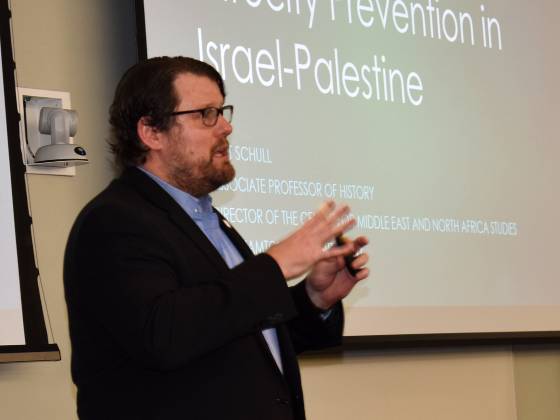Making Sense of the Current Situation
May 9, 2024

On April 17, Kent Schull, Ph.D. gave a lecture sponsored by the Alexandrian Society tackling the question of genocide and mass atrocity prevention regarding the current situation between Israel and Palestine. At the start of the lecture, Schull stated that he is not a partisan in the current situation, as he aims to bring out the humanity, stressing the importance of remembering the human beings at the center of this situation, setting aside any biases, getting past nationalist ideologies, regardless of religion, race, ethnicity, gender, and sexual preference.
“In the end,” he said, “it is human beings that are being directly affected from a variety of sides.” Schull claims that the common denominator is the disregard for human life and the respect and dignity of human beings. He acknowledged that this topic is controversial, and his aim is to situate this in a context where it can be freely discussed with respect and dignity.
“This conflict is a dispute about borders and sovereignty over territory that is roughly the size of New Jersey,” Schull states.
It involves 9.3 million Israeli citizens and 5.5 million Palestinians in the West Bank and Gaza Strip. It has claimed around 190,000 lives in total, including the ongoing Israeli offensive in Gaza. Sovereignty and borders has been a dispute between Israel and Palestine since World War I, when the Mandate for Palestine from the British administration took former territories from the Ottoman Empire and gave it to Palestine, but also required the British to create a “national home for the Jewish people” in that same territory.
Schull states that the terrorist attacks conducted by Hamas did not warrant or justify the current Israeli military action in Gaza. Under the Genocide Convention, South Africa decided to bring charges against Israel. The claims are that Israel has committed war crimes and mass atrocity, in violation of U.N. Genocide Convention. The International Court of Justice, a World Court established by the U.N. in 1945, voted 15-2 that there was merit and standing to the charges.
There has been massive displacement, home destruction, many civilian deaths, and Israel has prevented humanitarian aid and necessities to the Palestinian population in Gaza. The Ruling ordered Israel to take steps to follow the Genocide Convention, including submitting a full report as to its efforts to prevent civilian casualties, and steps to alleviate the humanitarian crisis in the area, among other things.
Schull defines Mass Atrocity Prevention. It comes from the Responsibility to Protect doctrine from the United Nations. Within it are four central principles: 1) Preventing armed conflict outbreak, 2) promoting human rights, rule of law and democratic governance, 3) strengthening civil society, and 4) building capacity and legitimacy of weak states.
The Responsibility to Protect (R2P) was unanimously ratified in 2005 by the U.N. and its General Assembly. The doctrine sought to ensure that the international community never again fails to halt the mass atrocity crimes of genocide, war crimes, ethnic cleansing and crimes against humanity. R2P was meant to strengthen was the Genocide Convention was about, as it still lacked in some areas. Within R2P are the Three Pillars, which state that every state has the Responsibility to Protect its populations from four mass atrocity crimes: genocide, war crimes, crimes against humanity and ethnic cleansing. The wider international community has the responsibility to encourage and assist individual states in meeting that responsibility, and if a state is failing to do so, the international community must be prepared to take appropriate collective action in a timely and decisive manner in accordance with the U.N. Charter.
There are obstacles to peace and a two-state solution for both Israel and Palestine. They both want viable statehood, control of things such as the electric grid, water table and other resources. Security for the territory, self-determination and protection of personal and national rights are important for both parties.
The Two State solution includes a solution to the settlements, a viable Palestinian state with full sovereignty, the refugee problem, meaning the return, compensation or a combination. Reformation of the Palestinian authority and security agencies, real security for both Palestinians and Israelis, Israeli political reform, and protection for Palestinian citizens of Israel are also needed for a two state solution.
Schull asks, “Is this even possible anymore?” He mentioned some alternatives, which he feels would result in continued, widespread violence, mass atrocity, terrorism, and the undermining of human dignity on both sides of this conflict.
He gives his final thought on this situation stating, “Each side of this conflict undoubtedly has the right to defend itself and/or resist occupation according to international laws and agreements. What is significant is how this defense and resistance is conducted. Both sides have resorted to violent and atrocious action as a primary option. There are other much more effective, peaceful, and compelling ways to solve disputes. It’s time both sides adopted these principles in true ‘good’ faith. We must also acknowledge the sheer inequality of power, persuasion, and influence that the Israeli side has over the Palestinian.”
About Kent Schull
Kent Schull comes with a former military intelligence background from the army, where he studied Arabic. He earned his B.S. from Brigham Young University and his Ph.D. from UCLA. He received his Masters of Studies at Oxford University, focused on Jewish studies, Israeli government politics and modern Hebrew. Schull has been trained in genocide and Mass Atrocity Prevention and is a faculty fellow at the Institute of Genocide and Mass Atrocity Prevention at Binghamton University, where he is an associate professor in history. He mainly teaches about forced migration, genocide across the Middle East and North Africa. Schull is also a two-time Fulbright Scholar to Turkey, has many publications as well as having co-edited volumes.